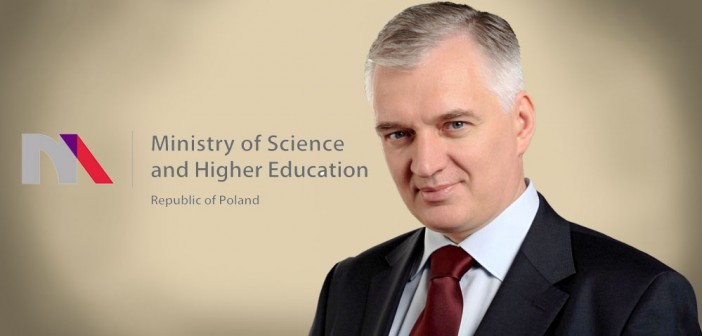Focus placed on co-operation between science and business, so that the Polish economy stops being imitative and becomes innovative; debureaucratisation of Polish universities; humanities as the “pet concern” – are the priorities of the ministry for this term of office – says the Head of the Ministry of Science and Higher Education (MNiSW), Jarosław Gowin, interviewed by the Polish Press Agency (PAP).
PAP: What are the priorities of the Ministry of Science for this term of office?
Jarosław Gowin: To free science and higher education from the burden of its bureaucratic duties, to launch mechanisms that promote high achievers, to concentrate on the culture of quality at Polish universities and in science – that is our first priority. The second priority is to establish a link between science and economy, which will increase the innovativeness of both science and economy. The third priority concerns strengthening Polish humanities.
I have met with many academics. They indicate that this environment has been wanting to consult with the Ministry for a long time. In all scientific disciplines we can sense great expectations of change and at the same time openness to collaboration with the Ministry and a lot of kindness. Those hopes probably arise from the fact that this is the first time since 1989 that a Minister of Science and Higher Education hosts the post of the Deputy Prime Minister.
PAP: What are your plans for reducing bureaucracy?
J.G.: Excessive bureaucracy, both in science and higher education, is the main obstacle. Universities are overwhelmed by the number of regulations and reporting duties imposed on them, unfortunately, primarily by the department I have taken over. Therefore, in collaboration with the General Council of Science and Higher Education, I have appointed a team which is already working hard on changing the regulations relating to the Polish Accreditation Committee and the National Qualifications Framework. Those two regulations are generally considered to be the source of the biggest bureaucratic barriers.
I remember from my days as a Rector that visits of the Polish Accreditation Committee (PKA) at the university were seen as invasive. We need to end that. The Accreditation Committee has a very important task – it should be a mentoring task. The Committee should assist universities with improving the quality of tuition. However, as it turns out, the excessively formal character of the Committee’s actions is a consequence of the provisions of the regulation. Therefore, we immediately begun to modify them in such a manner as to ensure that new solutions have been implemented by the start of the new academic year. Another issue is a generational change in PKA. The new members are younger than the previous team.
While tackling bureaucracy, we will also change the principles of employee assessment. Today, the assessment needs to be carried out every two years. For large universities, it is a never-ending process. Let us go back to the rule that the assessment needs to be carried out at least once every four years. However, if the Rector, Dean, Faculty Head believes that there is a need for more frequent assessment – they will be able to do so.
PAP: How will the life of researchers change once universities have been debureaucratised?
J.G.: Less paper work, more time for educational and scientific activity. As part of the new act on higher education, we are also planning to launch three career paths. Apart from the traditional, scientific and educational path, we will introduce a purely educational one. I was once a scholarship holder at Cambridge, one of the best universities in Europe. I remember that educators were given the same recognition as the greatest scientists, researchers and inventors.
However, we also want – and this is another priority of the Ministry and the entire government – to launch an implementation career path. Students will be able to complete doctoral and post-doctoral habilitation degrees on the basis of implementation activities. If we want to set ourselves free from the medium-growth trap, we need to improve the innovativeness of the Polish economy. In the last few years, billions of Polish zlotys were allocated to improve innovativeness, but the result is very poor. In the innovation ranking, we have dropped to the bottom group. That is a result of both low receptivity of the Polish economy in terms of innovation and excessive caution expressed by the academic environment, but primarily of unfavourable statutory solutions in regard to linking business with science. We need system solutions which facilitate active co-operation between universities, businesses and the industry.
PAP: What other changes are you planning to introduce to increase Polish innovativeness?
J.G.: The Ministry, with consent of the Prime Minister, has begun work aimed at introducing quick amendments to the act on innovation. It was adopted towards the end of the previous term of office. Unfortunately, in its current shape, it does not encourage anybody to benefit from the Polish academic output. We want to restore tax solutions within that act – planned by the original author – which encourage the business sector to collaborate with research institutes.
Parallel to those quick amendments, we are creating a white book of barriers which obstruct innovation. That document is to be prepared by the Innovation Council, which will be established next week. It will be composed of three Deputy Prime Ministers, the Minister of Digitization and the Minister of the Treasury, as well as the Minister of National Defence, Finance and the Environment. Based on the conclusions from the white book created by us, a completely new draft act on innovation will be drawn up, whose provisions should be ready in the third or fourth quarter this year. By recognising, naming and removing barriers, we will open development opportunities for Poland.
PAP: Have you already spoken to the Minister of Finance about the quick amendment of the act on innovation?
J.G.: Without collaboration with that department, our efforts would be in vain and our work fruitless. Minister Szałamacha perfectly understands the significance of those matters, but we also understand that we cannot place an excessively difficult challenge on the shoulders of the Minister of Finance. New tax reliefs, which support development but which will temporarily decrease the amount of funds coming into the budget, will therefore come into effect next year.
PAP: What goals would you like to achieve in terms of developing innovation by the end of office – will we finally stop being seen as just an “assembly plant”? We should also consider the EU funds we have been allocated from the EU budget to be used until 2020.
J.G.: If the nature of our economy remains unchanged, i.e. it stays imitative rather than innovative, we will still only be an assembly plant. And it will be an assembly plant for well-developed states not only from Europe, but also from Asia. We cannot let that happen. The success of the actions I am talking about is the make or break for our economy, and therefore – for the affluence of Polish citizens.
One of the government’s flagship projects will be reindustrialisation of Poland. Although I would rather call it neo-industrialisation, as it mainly concerns industries based on modern technologies. Soon, Deputy Prime Minister Morawiecki will present a list of industry sectors considered a priority by the government, as they show the greatest development potential. While analysing this map of economic regions, we will also look for academic potential – to see which regions feature both good economic resources and good academic resources. Those regions will be strongly promoted by the government.
To achieve this, we have to make good use of the funds available under the new financial framework of the EU. Poland will be able to receive several hundred billion PLN in grants. This is our last change, for many, many years, for developing both Polish science and economy. A chance to make a leap forward.
PAP: What about humanities? In the recent years, humanists have felt neglected. Let us remember that President Andrzej Duda, during his electoral campaign, together with Law and Justice , supported that community, even much earlier.
J.G.: The position of humanities is our separate priority. I am a philosopher, therefore a humanist. The Secretary of State at MNiSW is another philosopher, so naturally we understand the significance and needs of humanities.
That is why humanities will be our “pet concern” in this term of office of the Ministry. From next year, it will translate into increased funding for humanities. This year it was impossible, as I inherited the budget from my predecessor and it was too late to make significant amendments. But from this year’s perspective, I have good news for humanists in regard to the availability of additional funds: with the use of the innovation funds at the disposal of the National Centre for Research in Development, we are attempting to develop a path relating to what could be described as social innovations. This will mean that the humanist community will have access to structural funds on a significant scale for the first time.
However, we must not look at science only in terms of financial problems and material gains. Science, and especially humanities, has important social tasks. It builds the cultural and national identity, the sense of connection with past generations, the sense of pride arising from being Polish. And from the place our culture holds in the history of civilisation. These days, when innovation and creativity are the deciding factors shaping our future, science and higher education must be the priority in the policy of states which want to matter in the world.
PAP: The statement you made in November that the Art History Institute at the University of Warsaw has too many employees gained a lot of publicity. Should we expect employment reductions in humanities departments?
J.G.: Employment is an issue governed autonomously by the relevant university, it is not a Minister’s concern and I would be the last person to even wish to manually control universities.
The greatest challenge is to create the right conditions for humanists employed at universities to build their academic output. The crisis is connected to the depreciation of humanities by the previous governments, while limiting accessibility of funds for humanist scholars – both in terms of EU and state budget funds. In this regard, the situation will change for the better.
PAP: And what about the leading universities mentioned by you in the past?
J.G.: It really is a shame that Polish universities are placed in the fourth hundred of global classifications. That position does not reflect the potential of Polish science but demonstrates the existence of organisational barriers which make it difficult for universities to compete with the best facilities in Europe. That is one side of the coin. The other side is that when we start talking about selecting the leading universities, 90 per cent of the academic community start protesting.
I can definitely say that during this term of office no attempts will be made to arbitrarily indicate whether a particular university should be a leading one. Today, financing some universities on especially favourable terms would have to be done at the expense of others. And we wish to avoid that.
PAP: We understand that this process will not be carried out at the expense of smaller institutions?
J.G.: It is not approved societally nor politically. We are working on solutions which would help – although not entire universities – but the best research groups to achieve an increased share in international grants and research projects.
The process of distinguishing the leading universities will happen spontaneously. The grant system itself will show that the potential of different universities is truly varied. Regional universities are also needed. They are often a driving force for the region. But I think we all want the best Polish universities to reach the first hundred of the global ranking. I believe it is feasible within 5-6 years. And that is my goal.
Interviewed by Ludwika Tomala and Sonia Sobczyk. ℗
Emilia is an experienced editor, gifted wordsmith, a professional translator, but first of all, an avid reader.





